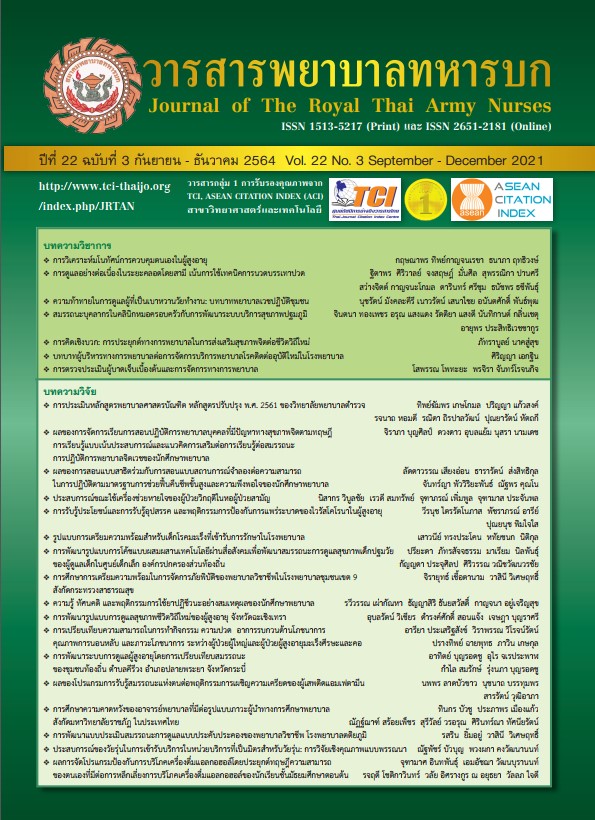Predicting Factors of Professional Nurses’Retention in Lampang Province
Keywords:
job retention, predictive factors, registered nurses, treatment and incentives for professional nurses to stay in the systemAbstract
The overall situation of job retention and resignation of registered nurses in Lampang province was at a high level. The mean was 3.77. When considering the 3 questions arranged in order of priority, the study found the statements “You were confident in continuing to work in this hospital” with the average of 3.98, followed by “When having problems at work, you can get help from your supervisor” with the average of 3.88, and “You are willing to continue working even though your current job did not meet expectations.” with the average of 3.69, respectively. The results of the study concerning the factors predicting the persistence of registered nurses in Lampang province revealed that there were 7 affective variables. These include 1) working environment, 2) rewarding, performances, compensation, and fair assessment, 3) relationship with the supervisors, 4) the ability to take care of family members without affecting the performances, 5) working period, 6) colleagues, and 7) the absence of the burden of taking care of the family members. All the variables accounted for 60.2% of the change in job persistence among registered nurses in Lampang province (R2 = 0.602).
Additionally, the results of the study on treatment guidelines and incentives for registered nurses to remain in the system are opportunities for advancement, work evaluation, increasing manpower, salary raise, promoting the good deeds, implementation of 2P safety policy, budget support for personnel development, teamwork building, a nanny system, assigning tasks that match the practitioners’ abilities, and listening to their opinions and allowing them to participating in decision making in operations.
Downloads
References
Sawaengdee K. The Current Nursing Workforce Situation in Thailand. Health Systems Research Institute (HSRI). 2008;2(1) : 40-46. (in Thai)
Tangchatchai B, Siritarungsri B, Sripunworasakul S, Rungkawat V. Factors Predicting Job Retention of Professional Nurses at the Northeast Regional Hospitals, Ministry of Public Health. Thai Journal of Nursing Council. 2011;26(4) : 43-54. (in Thai)
Worrachitti N, Pachusilpa G. Predicting Factors Of Professional Nurses’ Retention In Private Hospitals, Bangkok Metropolis. Journal of The Royal Thai Army Nurses. 2017; 18 (Supplement) : 112-120. (in Thai)
Silamom B, Deoisres W, Khumyu A. Factor Influencing the Retention of Generation Y Professional Nurse at a Hospital. Journal of Nursing and Health Care. 2018;36(1) : 62-71. (in Thai)
Mathis, R. L., & Jackson, J. H. Human resource management. 10thed. Singapore: Seng Lee Press; 2004. (in Thai)
Choeisuwan V, Changsila R, Sujijantorarat R, Boonrod W. Factors Related to Retention of Nurse Educators, The Royal Thai Navy College of Nursing. Journal of The Royal Thai Army Nurses. 2013;14(1) : 51-60. (in Thai)
Downloads
Published
How to Cite
Issue
Section
License
บทความหรือข้อคิดเห็นใดใดที่ปรากฏในวารสารพยาบาลทหารบกเป็นวรรณกรรมของผู้เขียน ซึ่งบรรณาธิการหรือสมาคมพยาบาลทหารบก ไม่จำเป็นต้องเห็นด้วย
บทความที่ได้รับการตีพิมพ์เป็นลิขสิทธิ์ของวารสารพยาบาลทหารบก
The ideas and opinions expressed in the Journal of The Royal Thai Army Nurses are those of the authors and not necessarily those
of the editor or Royal Thai Army Nurses Association.






